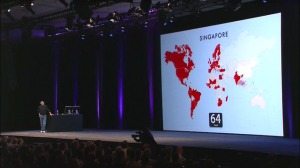 It is true, SingTel will carry the iPhone when it finally hit our shores later this year. The million-dollar questions now for the iPhone hopefuls are when exactly will it come, and how much will it cost? Any attempt to answer the first question is probably wild speculation at best, unless of course you happen to own SingTel.
It is true, SingTel will carry the iPhone when it finally hit our shores later this year. The million-dollar questions now for the iPhone hopefuls are when exactly will it come, and how much will it cost? Any attempt to answer the first question is probably wild speculation at best, unless of course you happen to own SingTel.
An educated guess, however, can probably predict the price of the iPhone when it launches in Singapore. The Straits Times, however, is not very good at this when tech reporters embarrass themselves and confuse their readers by contradicting one another’s reports within days of each other.
Chua Hian Hou first reported that we can expect to pay about $270 on June 10th,1 based on what an analyst, Nathan Burley, said. But Burley merely took out his calculator and converted US$199 to Singapore dollars (US$1 = S$1.363 as of today). Days later on June 15th, Tham Yuen-C found a different set of analysts who predicted between S$500 to (gasps) S$1,000 for the 8GB model.2 This, according to Tham’s sources, is because
Here, telco subsidies typically range from $100 to $500. But the more popular a model, the less subsidy is needed. Since the iPhone ‘sells itself’, it is not likely to be heavily subsidised.
When the Times technology correspondent, Alfred Siew, wrote another article two days later, Siew decided that he would ignore Tham’s article and go with Chua’s “analyst” instead. Indeed, he wrote:3
It is not yet known what SingTel will charge for the iPhone when it begins selling it later this year, though sources say that the phone is unlikely to cost more than the recommended US$199 or US$299.
Perhaps that’s why Digital Life has such a bad name among real tech enthusiasts. Then again, there’s a big difference between the typical Sim Lim Square tech enthusiast and the Apple enthusiast.
While Tham took time to find proper analysts who gave guesses more educated than consulting the currency convertor, it just doesn’t make sense for SingTel to offer the iPhone at such exorbitant rates—especially not when other operators are hot on the heels of SingTel to clinch an iPhone deal.4
Why would SingTel want to lower the entry to iPhone ownership? Because with full number portability and a first-strike advantage, it can attract subscribers from its rivals, especially those whose contracts would expire in the next few months. Knowing that the iPhone would come later this year helps tremendously to prevent iPhone hopefuls from renewing their expired contracts with StarHub or M1. After all, the iPhone is the only phone that people know about and go to great lengths to procure one even before it’s available. I don’t see anyone doing that for Samsung, Nokia or Sony Ericsson.
It’s hard to see why SingTel would want to give up on this opportunity to attract more onto its network rather than keeping people out because of the price barrier. One of SingTel’s boss, Quek Peck Leng, also recently confirmed that the iPhone would move at a “‘mass market friendly price… nowhere near’ the 499 euro (S$1,059) price tag in Europe.”5
But of course, the price of the phone is but one side of the story; there’s also the price of the monthly plan that you would be bounded to for the next two years. Similar reasoning however can be applied to how SingTel would possibly price its iPhone plans. After all, there’s little point in subsidising the iPhone heavily to attract subscribers on one hand, but dissuade them with pricey plans on the other hand.
Kevin Lim from theory.isthereason.com suggested that the price of an equivalent plan to AT&T’s offerings in the United States would cost a whooping S$117.45 per month.
It does sound initimidating, but that would be piecing together the iTwo Value plan for 300 minutes of outing voice calls and 500 free SMS, and an unlimited 3G data plan that Kevin wrote costs S$69.30.
A check on SingTel’s broadband mobile website however revealed that there’s no unlimited 3G data plan. The maximum bundled data usage for any plan is 50GB—well within the use of most normal and even expert users—and starts from S$22.42 per month. On the voice plan side, most students do not use any plan remotely close to the cost of iTwo Value, since they do not give a hoot about outgoing talk time.
Although the iPhone may appeal to some of the older generation (my girlfriend’s dad booked the iPhone the day after it was launched), the truth is that most of its users here would be the younger generation—students with high disposable income and lust over the latest technology gadgets. The other group of users would be the PMEBs, and they are the ones already paying the S$100-plus plans for their BlackBerries. If they were to hop onto the iPhone bandwagon, costs of the plan should be of the least concern to them.
Therefore, a more plausible plan that SingTel might offer would be one out to attract students instead, i.e. huge number of free SMSes, little outgoing talk time, decent among of data usage for those who might want to surf the web and check their e-mails on the go.
Piecing together the iOne Plus voice plan ($25.68 for 100 minutes outgoing, free unlimited SMS for students and NSFs, 500 for the rest) and the 1000 data plan ($22.42 for 50GB per month, 1Mbps download speed) would give us $48.10 per month, a conservative estimate at best.
SingTel has yet to announce any special voice-and-data plan for the iPhone, and if it does, it could come cheaper than this. If the iPhone does not get any special treatment, it is likely that you would be able to just mix-and-match your own plans like existing Smartphones that SingTel currently sells. There is even a possibility that you can forgo a data plan (not that this makes much sense), but that would probably result in a costlier iPhone as a result of losing the SingTel subsidy.
The high price for 3G data plans in Singapore do however suggest that most Singaporeans are not ready for Smartphones yet, or perhaps the other way around. Mike Davidson wrote that the recent price drop for the iPhone in the United States would “split the mobile world into two choices: settle for a free phone or buy an iPhone. There just aren’t many reasons to do anything else.”
While this may not yet happen in Singapore, the iPhone may very well usher in a new era where more people are finding use for 3G and data plans.
 Printing with Bonjour over AirPort Express was painfully slow, apparently because of a bug with Leopard and Bonjour. Here’s the not-so-glam fix from solo4675 on Apple discussion:
Printing with Bonjour over AirPort Express was painfully slow, apparently because of a bug with Leopard and Bonjour. Here’s the not-so-glam fix from solo4675 on Apple discussion: It is true,
It is true, 
